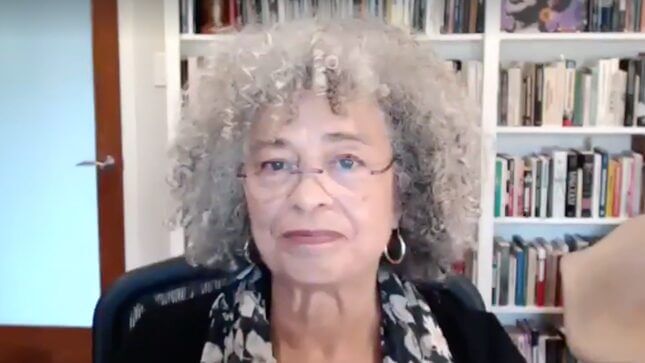Angela Davis Calls for 'Abolition Feminism Now'
Politics

In a Sunday morning livestream, Angela Davis discussed the limits of reform, asserting that the only way to free ourselves from the racism, sexism, homophobia, and transphobia endemic to our schools, prisons, police, and hospitals is to abolish those capitalist institutions so that we may reimagine their function and build something new.
Davis—whose seminal work, Are Prisons Obsolete?, you can read right here for free—posed a question to her fellow panelists on the Dream Defenders Facebook livestream: “If reforms have failed to have a transformative impact on police or jails or prisons…does it make sense to simply call for more reforms?”
No, she concluded. Rather than get “trapped on a treadmill of reform,” what we need is abolition:
If we look at the history of incarceration and the history of policing, one discovers there have been calls for reform throughout the histories of these institutions, and many of these reforms have been instituted. Nevertheless, both incarceration and policing have only grown more racist, more repressive, more violent…
We don’t look at policing and incarceration as discrete institutions that must remain at the core of our efforts to make human community. We look at abolition as a revolutionary perspective. It asks us to understand and resist not only the instution but all the conditions and forces that enable the continued existence of the instution. We don’t simply add ‘humane’ to the name of an instution that is so flawed, so structurally racist, so profoundly influenced by heteropatriarchal ideologies that we would have to say ‘We know policing is racist, so let’s struggle for more humane racist police.’ ‘We know incarceration is inherently class-biased, inherently violent, so let’s struggle for a more humane class bias. Let’s struggle for a more humane form of violence.’ That is precisely the argument made about the death penalty: a more humane form of killing people.
Abolition sidesteps such demonic non-solutions by removing the rot at its root, Davis said. But abolition means more than just subtraction; it also means addition, its scope only limited by our own imagination for how a better world might work:
Abolition involves both the negative process, overturning and disestablishing, but also the reconstructive process of creating something new—not just one thing, but addressing all of the enabling conditions. This is why we say ‘defund the police,’ but this is only the negative side. Reconstruction involves imagining new ways to address problems that police will never be able to address. ‘Defund the police’ also involves that reconstructive, productive dimension. Gender violence services instead of the police. Literacy instead of the police. Mental and physical healthcare services instead of the police. Jobs instead of the police. Housing instead of the police.
This holistic approach to address society’s root problems is a feminist one, Davis said—an explicitly anti-racist, anti-capitalist feminist one.
“Abolition needs feminism,” she said in closing. “Abolition feminism now!”
You can watch the full livestream here.